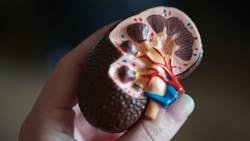COVID-19 long-haulers can develop kidney damage, disease
Research continues to mount indicating that many people who’ve had COVID-19 go on to suffer a range of adverse conditions months after their initial infections. A deep dive into federal health data adds to those concerns, pointing to a significant decline in kidney function among those dubbed COVID-19 long-haulers — and even among those who had mild infections of the virus.
The data, plumbed by researchers at Washington University School of Medicine in St. Louis and the Veterans Affairs St. Louis Health Care System, show that those infected with SARS-CoV-2 are at an increased likelihood of developing kidney damage as well as chronic and end-stage kidney diseases.
The study is published in the Journal of the American Society of Nephrology.
Known as the silent killer, kidney dysfunction and disease tend to be free of pain and other symptoms — so much so that the National Kidney Foundation estimates that 90% of people with ailing kidneys don’t know it. Kidney disease affects 37 million people in the U.S. and is one of the nation’s leading causes of death.
The findings coincide with a surge in COVID-19 infections spurred by the Delta variant. More than 38 million people have been diagnosed with the virus since the pandemic started.
The researchers analyzed de-identified medical records in a database maintained by the U.S. Department of Veterans Affairs. The COVID-19 patients in the study were mostly men and in their late 60s; however, the researchers also analyzed data that included 151,289 women — including 8,817 with COVID-19 — and adults of all ages. Among the COVID-19 patients, 12,376 (13.9%) required hospitalization, including 4,146 (4.6%) who were admitted to intensive care units (ICUs).
Compared with patients who did not become infected, people who contracted the virus but did not need to be hospitalized for it had a 15% higher risk of suffering. The risk increased for patients hospitalized for COVID-19, and considerably so for those who were in the ICU for the virus: seven times the risk of experiencing a major adverse kidney event, eight times the risk of acute kidney injury, and 13 times the risk of end-stage kidney disease.
After the initial 30 days of COVID-19 infection, 4,757 (5.3%) of the patients experienced a decrease of 30% or more in glomerular filtration rates (GFR), which physicians use to assess kidney function and, if applicable, determine the severity of kidney disease. The rate is determined by a simple blood test that measures levels of creatinine, a waste product in the blood that is filtered by the kidneys and discarded into urine.
The researchers found that people who had milder COVID-19 cases had 1.09 times the risk of having an estimated GFR decline of 30% or more. For hospitalized COVID-19 patients not in intensive care units, there was two times the risk of having an estimated GFR decrease of 30% or more, while intensive care unit patients were at three times the risk of experiencing an estimated GFR drop of 30% or more.

